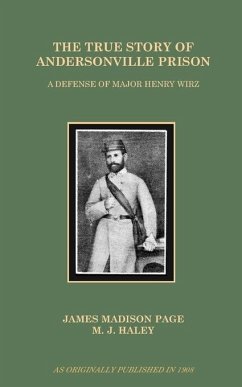Five hundred prisoners arrived at Andersonville in February 1864, the first of 32,000 men to be imprisoned there before the camp was closed by Federal forces in April 1865. Most of the prisoners suffered greatly--and 13,000 of them died--because of poor organization, meager supplies, the Federal government's refusal to exchange prisoners, and often the cruelty of men and a government engaged in a losing battle for survival.Why was this squalor, mismanagement, and waste allowed at Andersonville? Looking for an answer, Ovid Futch cut through charges and counter-charges that have made the camp a subject of bitter controversy.
Hinweis: Dieser Artikel kann nur an eine deutsche Lieferadresse ausgeliefert werden.
Hinweis: Dieser Artikel kann nur an eine deutsche Lieferadresse ausgeliefert werden.








